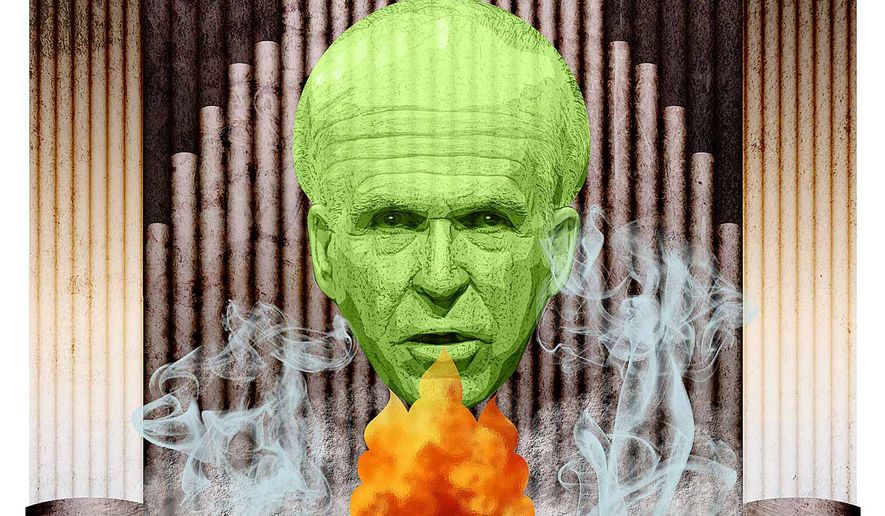OPINION:
An anonymous CIA official tells The Washington Post and The New York Times that Russia hacked to elect Donald Trump. Gives zero details. The CIA refuses to meet with the congressional intelligence committees. After a week of media echoes that the voters were victims of “fake news” conspiracies including from the Russians, The Hill reports: “Poll: More than half of Americans bothered by Russian interference in election.” Hence John Podesta, Hillary’s campaign manager, formerly President Obama’s senior counselor, was on firm public relations grounds when he contended that the 2016 elections were not “free and fair.” Presto: America’s electoral repudiation of the ruling class is on the skids toward delegitimization.
The Trump team helps grease those skids. The normally sure-footed Kellyanne Conway said President-elect Trump “totally does” respect the intelligence community, while Mr. Trump’s Chief-of-Staff-to-be Reince Priebus answered “no” when asked whether he thought CIA Director John Brennan was “politically motivated.” Truthfully, The Wall Street Journal reported “Trump team tones down skepticism on Russia hacking.” Mr. Trump’s failure to question the legitimacy of what the CIA is doing to delegitimize him reprises George W. Bush’s acquiescence as CIA embroiled his presidency in fake scandals.
But questioning the CIA’s intellectual authority and politics is essential to keeping it honest, to fulfilling the president’s and Congress’ own responsibility, and to the public’s grip on reality.
What is the CIA is doing to Mr. Trump? What is the point of anonymous accusations that Mr. Trump’s refusal to listen to some CIA briefings shows his pride in ignorance? How does Mr. Trump plan to react when — not if — the CIA will publicize “top secret” conclusions contradicting President Trump’s policies or when it will claim he failed to heed secret warnings that may never have existed? The CIA has done such things routinely to Republican administrations.
In short, the CIA has always been part of the left wing of America’s ruling class. The “Russian hacking affair” is another instance of the perennial effort by which this class defends its claim to be the arbiter of truth and authority. Since the CIA has always possessed far fewer facts with far greater incertitude than the body politic imagines, it confuses its officials’ socio-political predilections with facts. Over more than a half-century, the CIA has purveyed them as facts because very few outsiders ever get behind its layered curtains of secrecy — which it flashes open for favorite journalists. Secrecy, which is essential to intelligence, presents a well-nigh irresistible temptation to cover insufficiency and self indulgence with the standard objection: “Our conclusions are based on facts of which you are not aware and that we cannot share with you.”
The CIA has not resisted this temptation because the media and the movies have bought into its myths of omniscience and derring-do; and because only very rarely have the presidents and members of Congress whose duty it is to make judgments about foreign affairs questioned what there is behind the CIA’s curtains. Seldom have they exercised their right to look behind them. Had they looked, they would have seen that, behind all those code word classifications — with the exception of military intelligence and a few very “black” programs — there is often very little there.
Necessary as rigorous, unrestricted, independent oversight is, it cannot resolve the CIA’s basic problems — e.g., a human intelligence system that is increasingly a caricature of itself, a lack of counter-intelligence that continues to undermine the reliability of all collection. But it can distinguish what is known from what is opined. It can reduce, if not eliminate, the disparity between how much or little there is behind secrecy’s curtains and what executive policymakers and Congress believe. My job as the designee of the Senate Intelligence Committee’s budget chairman, with clearances cut across all compartments, was to compare the CIA’s claims about operations and analyses with the underlying facts. When CIA Director Robert Gates gave me the agency’s 40 top people as a captive audience, I stressed that distinguishing between fact and opinion is key to the integrity of intelligence.
Nor can presidential, congressional and media skepticism about the CIA’s pronunciamentos fix its addiction to interference in U.S. domestic politics or policymaking. But demystifying intelligence, separating what is real from what is in the movies and TV, would limit intelligence officials’ pretentiousness, what policymakers expect from intelligence, as well as the public’s credulity.
Above all, knowledge that, all too often, there is little more behind the CIA’s curtains of secrecy than what Dorothy found in the Land of Oz would remind all that nothing that intelligence says or does not say can relieve presidents, their agents and Congress of any responsibility whatever for the decisions they make or fail to make.
• Angelo M. Codevilla is professor emeritus of international relations at Boston University and a member of the Hoover Institution’s working group on military history. His latest book is “To Make and Keep Peace Among Ourselves and with All Nations” (Hoover Institution Press, 2014).




Please read our comment policy before commenting.